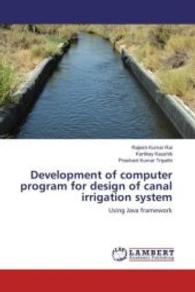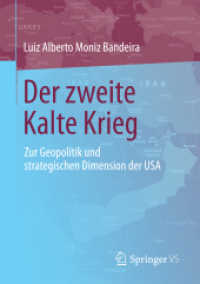Full Description
Equity as Praxis in Early Childhood Education and Care aims to map, deconstruct, and engage with different models of equity as they pertain to the early childhood education landscape in Ontario. Drawing on marginalized narratives of gender, race, Indigeneity, dis/ability and inclusion, and migration, immigration, and displacement, the authors discuss how to advance the field and make it more equitable for children, families, early childhood educators, and all other practitioners. This edited collection outlines the current political climate of early childhood education and care in Ontario through a critical analysis of policies and dominant discourses of equity and inclusion. By prompting readers to reflect on and critique their understandings of children, families, communities, and practices in the field, the authors seek to provide counternarratives to Eurocentric developmentalist hegemonies and an alternative strength-based approach to critical and transformative praxis.This vital text encourages rethinking how narratives of equity and inclusion are constructed and what this means for young children and their families in Ontario, as well as throughout Canada. This is an essential resource for students in early childhood education and care, early childhood studies, and education programs.
FEATURES:
Includes perspectives from multiple positionalities in the field to provide a critical and interdisciplinary approach
Draws on a reconceptualist lens to present a critique of developmentalist approaches
Encourages readers to engage with the content by practising critical self-examination and considering social factors and forces that inform their own concepts
Contents
Foreword - Judith K. Bernhard
Introduction: Healing and Hoping in Community and Love as a Tool for Advancing Equity as Praxis - Zuhra Abawi, Ardavan Eizadirad, and Rachel Berman
Chapter 1: State of Emergency: Mapping Inequities in Early Childhood Education and Care in Canada - Ardavan Eizadirad and Zuhra Abawi
Chapter 2: Low-Income Racialized Children and Access to Quality ECEC in Ontario - Alana Butler
Chapter 3: Troubling Dominant Discourses and Stories that Shape Our Understanding of the Child Refugee - Nidhi Menon
Chapter 4: Equity Enacted: Possibilities for Difference in ECEC through a Critical Ethics of Care Approach - Alana Powell, Lisa Johnston, and Rachel Langford
Chapter 5: Planning Time for Equity: A (Re)Examination of a Study of ECEs' Perspectives on Planning Time in Southern Ontario - Lisa Johnston
Chapter 6: Using Femme Theory to Foster a Feminine-Inclusive Early Childhood Education and Care Practice - Adam Davies and Rhea Ashley Hoskin
Chapter 7: Making Space for Indigenous Knowledge in an Urban Child-Care Centre - Maya-Rose Simon
Chapter 8: Failure and Loss as a Methodological, Relational, and Ethical Necessity in Teaching and Learning in the Early Years - Maria Karmiris
Chapter 9: Reflect, Enact, and Transform: A Preliminary Anti-Racism Guide for Early Childhood Educators - Kerry-Ann Escayg
Conclusion: Some Concluding Thoughts on Equity as Praxis - Rachel Berman
Contributor Biographies








